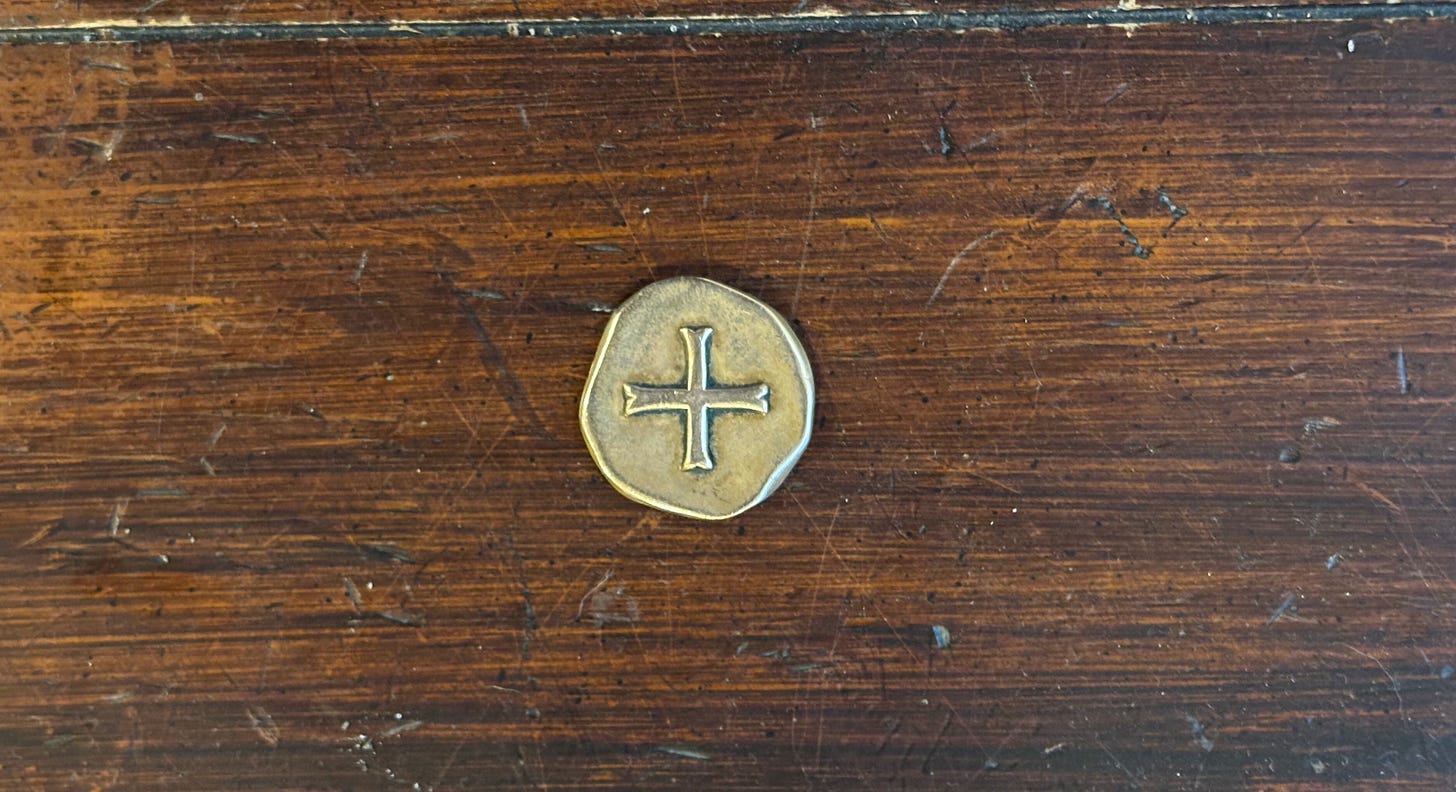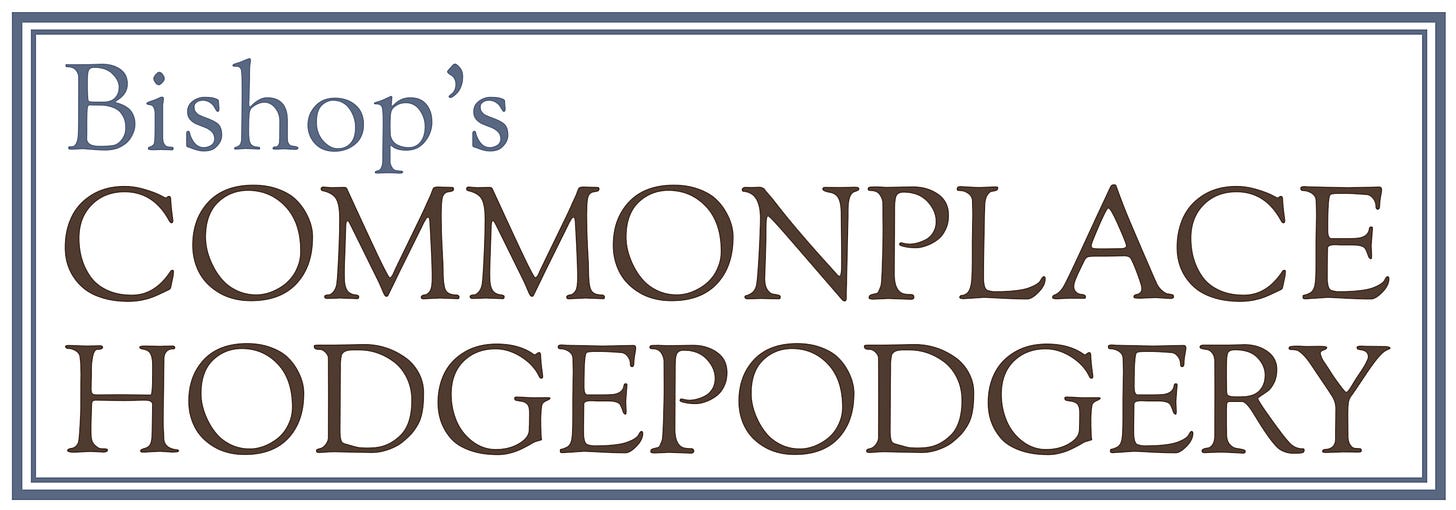My Journey (So Far) Toward a More Sacramental Faith
My practice of the Christian faith is admittedly a piecemeal collection of different elements gathered together into a sort of patchwork that has changed and shifted over the years:
Worship: in nondenominational and Evangelical churches (from college through today)
Theology: Reformed and Puritan reading and study (for the past 10+ years)
Personal devotion: elements of liturgical Anglican practice (the last 2–3 years)
It’s in this later direction — the Anglicanish devotional direction — that I feel drawn more and more, and I wanted to put down, as best I can, how I got there. (I understand that I might be part of a trend.)
I think what I’ve valued most about the Reformed and Puritan tradition in which I’ve felt most at home is how intellectually satisfying and coherent it is. I especially love the Puritans. I’ve learned to value much of their writing; it’s remarkably biblical and practical and devotional and unexpectedly warm and caring. I absolutely love reading their books and praying their prayers. In addition to the fact that I was raised Reformed, I also think that the tradition’s intellectual depth is important and something I don't ever want to leave behind. It’s been so very satisfying on the Truth side of things.
But I recently feel a pull toward Goodness and Beauty that I frankly haven’t found in the Reformed or Evangelical worlds. In particular, that’s included a draw toward liturgical worship and a sacramental view of not only the Christian faith but of the world.
I moved toward some of these practices in fits and starts: following the church calendar, praying from the Book of Common Prayer, using an Anglican rosary. To be clear, I don’t think the church calendar or praying the daily office are strictly necessary parts of the Christian faith — only that they’re helpful and beneficial, and I suspect we’ve lost something important by going without that sort of thing. To me, the liturgical elements still seem personal or preferential — formative, yes, and helpful, but certainly not required (and something at which many personalities chafe).
But I do think the sacramental view is essential and necessary, because I believe God made the world to be sacramental. And if that’s right, then a sacramental vision isn’t optional — it’s baked into reality.
Let’s glance at the church’s central sacrament: Many Evangelicals hold a memorialist-only view of the Lord’s Supper; the bread and wine are basically symbolic memory aids that help you think of Christ’s sacrifice. And the Supper is that, and does that. But I’ve come to a “real presence” view of the Supper, in which we truly commune with Christ in a unique way at the Table — he’s there spiritually (if not physically or substantially) in a way unique to the sacrament. (Actually, the Puritan tradition is where I first recovered this.)
I guess a primarily intellectual faith is starting to feel thin. The Reformed faith is True, and it can provide a rigorous accounting of its truth. I really do believe that. And it’s a good thing. I just have itches that it doesn’t seem to scratch on its own anymore. Instead, I’ve begun to hunger for a more physical, experiential, embodied, and sacramental faith. To put it crudely, I found that it was no longer enough to order another Banner of Truth volume that would help me think truer thoughts about the Lord’s Supper, and instead simply found that I was hungry for the body and blood of Christ.
(Incidentally, this sacramental vision is the sort of thing that I’ve also been approaching from another direction by way of poetry. The imagination is a means of knowing the truth; the things of earth really are filled with both meaning and grace; metaphor and sacrament are similar sorts of things.)
A Sacramental Example
For some time now, I’ve taken to making the sign of the cross. (There really ought to be a single verb to express that, oughtn’t there?) It started when prompted by some of the liturgical prayers I use (conveniently marked with a ☩ in the prayer book) or when praying the Glory Be (“Glory be to the Father and to the Son and to the Holy Spirit. As it was in the beginning, is now, and ever shall be, world without end. Amen.”). But then it started to spill over into other times, too: before I go to bed, or when I wake up in the morning, or before I leave for work, or when I feel an acute need of God’s help or presence, or when I’m fighting the temptation to sin. I rarely do it in public because my Dutch Reformed roots make me uncomfortable with that, but I very often do it in private.
I don’t think there’s anything magical or superstitious about it, or anything like that. I just find it helpful and meaningful, in a similar way to how some people find raising their hands during worship helpful or meaningful, or kneeling in prayer or during worship, or folding their hands and closing their eyes to pray. I was at the bar with an Anglican friend who crossed himself during our prayer; when another friend raised an eyebrow, he said, “We’re both body and soul. We should pray with our bodies, too.” I think that’s exactly right. So I ultimately see it as a sort of embodied prayer.
I do think it’s other things, too:
A reminder of my baptism
A symbolic putting on of Christ
An expression and affirmation that I have been crucified with him, a la Galatians 2:20, which I occasionally recite while crossing myself
A deliberate recollection of the gospel
A transient version of wearing a cross necklace or a Christian tattoo or t-shirt
A proclamation of my faith (were I to do it publicly)
An appeal for help and the presence of God.
All of that is wrapped up in it, but the primary thing, I think, is an embodied prayer.
I’ve long carried in my pocket a brass coin with a Greek cross (pictured above), and one day I started holding the coin and crossing myself with it before slipping it into my pocket, for no reason other than that the pairing of the crosses made it seem appropriate. I found over time that when I put my hand into my pocket and touched the coin (whether for that purpose or because I was digging out my keys), it reflexively brought to mind everything that is brought to mind when I cross myself. But “brought to mind” is the wrong phrase, because it isn’t a purely mental thing; it embodied everything that is embodied when I cross myself. Because of its association with crossing myself, simply touching the coin has become a sort of embodied prayer.
(I hasten to reinforce here that I do not believe there is anything magical or superstitious or inherently special about the coin. I do think the practice is helpful to me and good for me, but I don’t think it’s necessary or magical or that the coin carries any special significance in itself.)
Okay, finally to the point: Last summer, something curious happened. When we took a family road trip to Iowa, I left the coin at home because I didn’t want it to fall out at a gas pump in the middle of a cornfield somewhere and be lost forever. At some point, I paid cash for something and received 35 cents back: a quarter and a dime. And as I slipped the coins into my pocket, all of it came rushing back: the Glory Be, Christ and him crucified, the reminder of my own death and resurrection with him, my identification with Christ, all of it. And every time I reached into my pocket and felt those two grimy convenience store coins there — those two filthy, throwaway nothings — the same thing happened all over again. The most ordinary and forgettable of objects had become a common sacrament.
This is still the closest I’ve come to experiencing (rather than simply trying to understand) a sacramental vision of the world.
Where That Leaves Me
So, now what? I don’t want to leave behind any of the truths of the Reformed faith. I’m a child of the Reformation, through and through. I still value and affirm what I’ve learned from my friends in the Presbyterian and Dutch Reformed and Reformed Baptist and Puritan camps. But I also think that much of these traditions (at least as they’re practiced today) are products of the Enlightenment and that, in many cases, they’ve unnecessarily jettisoned important, embodied, and enchanted elements of the Christian life and practice.
In other words, the most recent leg of my spiritual journey — the most recent patches I’ve been stitching into my piecemeal — has been spent asking what we’ve lost that might be worth reclaiming. I think if I could find those things (liturgical formation and a sacramental view of the world) in the Reformed church in a really robust way, I’d be most naturally happy there. (Peter Leithart comes to mind, though I don’t follow Theopolis very closely.) But when I look at where these things exist natively, I suspect I’ll find them in Anglicanism.
So that’s where I am right now: Reformed theology with a high value on liturgical practice in personal devotion and with a hunger for a sacramental experience of Christianity and the world. I think I’ll sit tight here for a while.
Postscript: What About Worship?
Yes, I know: I’ve neglected through this whole piece to talk about worship — and the truth is, that’s been the trickiest part about all of this. My family worships in evangelical and nondenominational churches because, well, because we always have. Since before my wife and I were married, we worshipped together in these churches; they’re all my kids have ever known. And our current church is a very good church. I love and trust its leaders, and the gospel is faithfully proclaimed, and the people love and serve each other, and disciples are made. It’s a v. good place.
The whole movement I described above — from a primarily intellectual faith to a more embodied and sacramental faith — has been a personal one, not a familial one. So I find myself at a place where worshipping at an Anglican service feels natural and homey to me, but foreign and stuffy and rote to the rest of my family. I don’t know if it will ever feel otherwise to them. If it does, it will be through patient and gentle transformation, through God working in them the way he worked in me. And if it doesn’t — well, as I said, we’re in a good place.
Subscribe to Josh Bishop writes.
And check out my other Substack publications:






